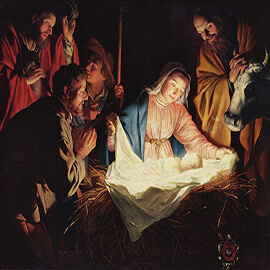
Christmas in Iran
| History 2020-03-12 14:34:15
It may be surprising Christmas is celebrated in Iran like everywhere
Christmas in Iran
It may be surprising because for a predominantly Muslim nation where Christians make up less than 1% of the country's population, you may think that all signs and traces of Christmas, from pine trees decorated with red, green and gold gift boxes placed behind shop windows to nativity scenes of the Virgin Mary, Joseph and baby Jesus, will be difficult, if not impossible, to spot on the streets.
But in Tehran, in particular, where more than 46,000 Christians of the whole 117,000 members of this minority group live, the spirit of Christmas can be felt especially in the Christian neighborhoods of the capital.
Like everywhere else in the world, Christmas is celebrated at home in the company of friends and family, followed by several days of paying visits to relatives (a tradition that we also observe during Norouz holidays). There are at least 600 churches in Iran which hold special services on Christmas night, such as the St. Sarkis Armenian Church on Villa Avenue, Tehran. Special celebrations are also held at the Ararat Club in the Vanak neighborhood of Tehran, which is owned by the Armenian Cultural Ararat Organization and founded in 1944, and is considered as one of the largest associations of Iranian Armenians.
Every year, the Iranian Christians celebrate the occasion by decorating Christmas trees, exchanging gifts, and attending services. During Christmas season, Christmas Trees can be seen from Windows in Tehran and north-western provinces of the country. Although a minority religious group in Iran, Christians of Iran are free to practice their religion and perform their religious rituals.
During Christmas, joy and merriment reigns supreme for the Christian population all over the country. Christmas in Iran is popularly known by the name of "Little Feast". Although Christmas has an official recognition in Iran, it is not a national holiday. The festival is preceded by "Little Fast", or 25 days of fasting from animal products. The ritual is observed, mainly by the Assyrians, from December 1 and needs one to abstain from meat, eggs and even dairy products such as milk and cheese. For devout Christians, it is a time of peace and meditation. The fasting is intended to purify the mind, body and soul to welcome Christ. Most of the community attend church services during the time. While the "Little Fast" is observed from December 1 - December 25, the "Big Fast" occurs during Lent, the six weeks preceding Easter. It is not until the "Little Fast" ends that the Christmas feast begins. The Christmas Eve is the last day of the "Little Fast" and even before dawn on Christmas Day, the people attend Mass to receive Communion. It is only after they receive this Communion that they are permitted to breakfast.
Thereupon, preparations for the great Christmas feast begin. Plenty of meat is cooked up for the celebrations. The main dish for Christmas Day is a kind of chicken barley stew, popularly known as "Harrissa", which is cooked in large quantities and is stored and eaten for several days. For Iranian boys and girls, Christmas week is the time for happiness. It is the occasion when they can indulge in joyous celebrations and gorge on delicious recipes once again.
Do Muslims Celebrate Christmas?
Even if Muslims don’t celebrate Christmas as a religious holiday, how is it any different from non-Christians celebrating Christmas without honoring Jesus? Muslims treat the holidays as they are: holidays. Those that have time off, will use it to spend with those they care about, or just enjoy the day off work. Some might watch Christmas specials on TV or movies, take their children to take photos with Santa, or go to Christmas parties hosted by their non-Muslim friends. It’s about time people live and let live.